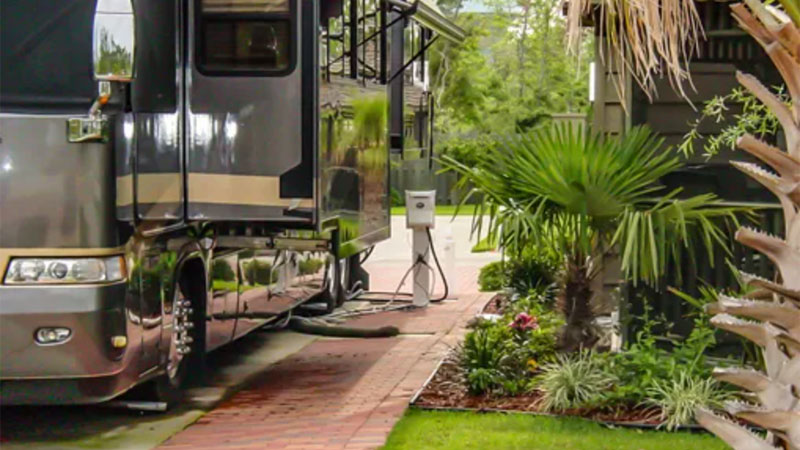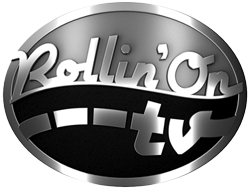RV Straight Talk with Jeff Johnston
When on Shore Power Should Battery Remain On?
Hi, I’m Jeff Johnston and welcome to “RV Straight Talk.” You can submit your questions by email to Jeff @rollinontv.com or by going to our website at rollinontv.com and clicking on the “RV Straight Talk” link. This week, our letter concerns more about RV battery usage. Keep ’em coming, folks. The more we can help understanding your RV systems, the better.
This week, Jim writes, and this is a long note so stick with us. “When at a campground using shore power, does the battery need to be on? The converter handles the system well with the battery off. My thought is that high-draw DC loads such as moving the slideout may put excessive demand on the converter or charger. The battery should assist this high demand DC load. I am concerned that over-charging the battery, if the converter is online for several days.”
 Well, yes, to answer the first part of the question, the battery should be connected at all times to the converter when you’re out using your RV. Not only does the battery provide the higher amp. power that you need for things that you mentioned, like the slideout room loads or leveling jacks or that sort of thing, it also acts as something of a buffer so that the power that comes in–the 12-volt power that comes in from the converter is converted from the shore power and, in some places, shore power can be a little bit harum-scarum, you know, it’s not entirely as consistent, so the 12 volts that comes out of the converter isn’t as consistent as the 12 volts coming straight out of the battery. The converter helps to refill the battery, then the battery in turn provides power for your accessories and devices. So, yes, the answer is keep your battery connected. As far as the battery overcharging if it’s connected to the converter for several days during that RV trip, no, it’s not gonna happen in the course of several days. If your converter does not have a multi-stage charging system which senses the state of charge of the battery and then knocks it back down to a trickle charge when the battery is full, yes, an older-style converter can overcharge your battery but that usually takes weeks or months of being plugged in, like when someone’s storing an RV at home, next to their house, and they keep it plugged in the whole time it’s stored. In a case like that, you should go with something like a small battery tender, the little-bitty converter that’s–or the charger that’s more or less just a trickle charger. So keeping it connected to your converter is not gonna hurt it while you’re out using it for your RV trip. Well, thanks for writing, Jim, and I’ll make sure you receive one of our classy “Rollin’ On TV” coffee mugs very similar to this one.
Well, yes, to answer the first part of the question, the battery should be connected at all times to the converter when you’re out using your RV. Not only does the battery provide the higher amp. power that you need for things that you mentioned, like the slideout room loads or leveling jacks or that sort of thing, it also acts as something of a buffer so that the power that comes in–the 12-volt power that comes in from the converter is converted from the shore power and, in some places, shore power can be a little bit harum-scarum, you know, it’s not entirely as consistent, so the 12 volts that comes out of the converter isn’t as consistent as the 12 volts coming straight out of the battery. The converter helps to refill the battery, then the battery in turn provides power for your accessories and devices. So, yes, the answer is keep your battery connected. As far as the battery overcharging if it’s connected to the converter for several days during that RV trip, no, it’s not gonna happen in the course of several days. If your converter does not have a multi-stage charging system which senses the state of charge of the battery and then knocks it back down to a trickle charge when the battery is full, yes, an older-style converter can overcharge your battery but that usually takes weeks or months of being plugged in, like when someone’s storing an RV at home, next to their house, and they keep it plugged in the whole time it’s stored. In a case like that, you should go with something like a small battery tender, the little-bitty converter that’s–or the charger that’s more or less just a trickle charger. So keeping it connected to your converter is not gonna hurt it while you’re out using it for your RV trip. Well, thanks for writing, Jim, and I’ll make sure you receive one of our classy “Rollin’ On TV” coffee mugs very similar to this one.
If you have an RV question, send it in and I’ll get you a straight, honest answer. If we use your question on our website or the TV show, we’ll send you a “Rollin’ On TV” mug like this one. We regret we can’t personally answer every question we receive but we do answer the ones we use on the show or the website. That’s it for this week, and we’ll see you next time.

